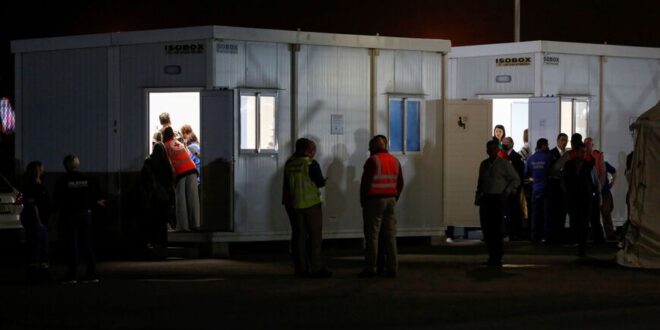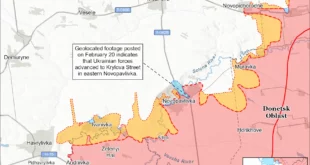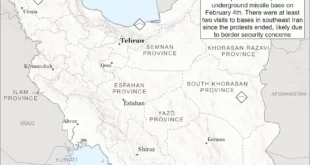Conflict in Abraham Accords nation demonstrates limits of US power, while Egypt and Saudi Arabia watch anxiously.
The Sudanese civil war bears witness to the global disorder spreading in the Middle East, in the wake of the Ukraine conflict and the steady weakening of American leadership.
Sudan had raised the hopes of democrats worldwide in April 2019, when its people ousted dictator Omar al-Bashir after a quarter of a century in office, during which he had been charged with war crimes, genocide and crimes against humanity. But such hopes were dashed in the October 2021 military coup, led by the now-warring generals Abdel Fattah al-Burhan and his former deputy Mohammad Hamdan “Hemedti” Daglo.
Meanwhile, Sudan had joined the Abraham Accords in January 2021 — an important issue for Israel as Khartoum had been the main hub for Iranian weapons smuggled to Hamas. Only two months ago, on Feb. 2, Israeli Foreign Minister Eli Cohen paid his first official visit to Sudan, to lay the ground for a peace treaty and complete normalization between the two countries. Though he was pictured shaking hands with Burhan, Hemedti at the time made it public he had no knowledge of the visit and did not meet the delegation, according to state news agency SUNA.
The huge African country, one of the poorest in the world, and with a strong history of enmity against the US, now seemed to be part and parcel of the US system of alliances in the Middle East. Nevertheless, Russian Foreign Minister Sergey Lavrov visited Khartoum on Feb. 9, a few days after his Israeli counterpart, and finalized an agreement for a Red Sea logistical center for the Russian fleet in Port Sudan — meeting with both Burhan and Hemedti. Rumors were floated that Russian weaponry was on its way, and that the ubiquitous Wagner Group, the Kremlin’s unofficial spearhead in a number of African countries such as Mali, was active in Sudan’s gold-mining industry.
The confrontation is bad news for the US, as it shows that Washington doesn’t have much sway over an Abraham Accords signatory, hence undermining the American capacity to secure its alleged allies in the Middle East and North Africa. Such an embarrassment comes after the Chinese mediation between Saudi Arabia and Iran, and the Saudi rebuttal to President Biden over oil production. Though Secretary of State Antony Blinken made a Sudan truce announcement from Washington on April 24, it remains to be seen to what extent it will be implemented, while most foreign countries evacuate their citizens and diplomats under gunfire.
Only Volker Perthes, who heads the UN mission to pressure the military brass towards democratic transition, decided to remain in Khartoum — now absent all other international personnel. Though some regional heavyweights such as Israel and the UAE claimed they had privileged access to the heads of both fighting camps, it has proved to be of little avail.
For Egypt, pacification of its upstream neighbor is all the more vital as relations sour with Ethiopia over the latter’s Great Renaissance Dam — a massive nationalist issue for President Abdel Fattah al-Sisi, who claims he will fight for “every drop of Nile water.” On April 21, Hemedti’s Rapid Support Forces seized Egyptian Mig-29M2 fighter jets, with their crews and support teams, prepositioned at Meroe airport (150 km north of Khartoum) so as to deter Ethiopia. The 200 soldiers would be later flown back to Egypt, while the planes look damaged and unable to fly.
Sisi had given red carpet treatment to Hemedti’s rival, Burhan, who made three visits to Cairo. Such an exposure of military weakness did not bode well for the Egyptian military, all the more so while the latest Pentagon leaks had unveiled Egyptian plans to deliver tens of thousands of mortar shells to the Russian army. And it had never been acknowledged previously that MIG fighter jets were standing in Meroe and with what aim — to the embarrassment of the Egyptian top brass.
UN Secretary General Antonio Gutteres warned on April 20 that the continued infighting in Sudan “threatened the whole region and beyond.” The battle has hampered US allies, and further weakened the Abraham Accords, which already suffered from the strong anti-Palestinian agenda of the Netanyahu government. For the time being, Saudi Arabia, the regional superpower, is holding its breath while contemplating the military challenge on the opposite shore of the Red Sea. Sudan, where the kingdom bought much agricultural land, is key to its food security and regional clout, and Crown Prince Muhammad bin Salman cannot let it run amok.
 Eurasia Press & News
Eurasia Press & News




